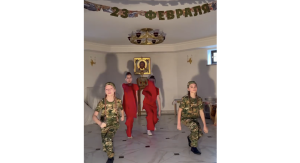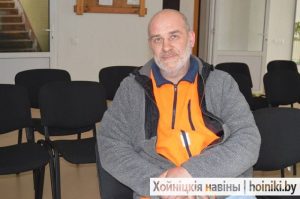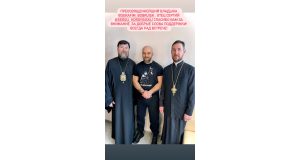Forum 18. BELARUS: Officials warn clergy not to violate strict state restrictions
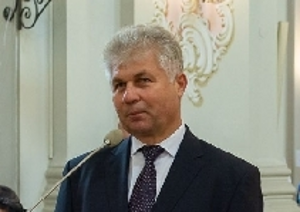

Organisation"Forum 18"
Норвежская организация, целью которой является содействие религиозной свободе.
4 January 2024
Felix Corley, Forum 18
Olga Chemodanova, Head of Minsk City Executive Committee’s Ideology Department, warned a Minsk Orthodox Diocese clergy meeting not to violate the state’s strict restrictions. “Her address contained open threats towards priests who are ideologically alien,” Christian Vision noted. “Chemodanova gave them to understand that they should expect prison.” Religious affairs official Aleksandr Rumak warned that there should be no politics in church and no “non-religious symbols”. The warnings echo provisions of the now-adopted new Religion Law. The Supreme Court upheld the liquidation of Minsk’s New Life Church.
Two leading state officials warned hundreds of Orthodox clergy that those violating strict state restrictions would face punishment. Olga Chemodanova, Head of the Ideology Department of Minsk City Executive Committee, told priests of Minsk Orthodox Diocese that during the past year, state agencies had “monitored” more than 500 religious communities. Officials had prevented the distribution of “extremist” literature and had discovered that prayers were being said in church for the victory of Ukraine in the war (something she clearly did not like).

© Viktar Vedzen/Catholic.by
In his address at the clergy meeting on 20 December 2023, Plenipotentiary for Religious and Ethnic Affairs Aleksandr Rumak (the regime’s senior religious affairs official) warned the clergy forcefully that there was to be no politics in church. He also warned that no “non-religious symbols” should be displayed in churches (see below).
Rumak’s warnings echoed some of the provisions of the new Religion Law, approved by the non-freely elected parliament in December 2023 and signed into law by Aleksandr Lukashenko on 30 December 2023 (see forthcoming F18News article).
Fr Aleksandr Shramko, who served in Minsk Orthodox Diocese until November 2019, says that the Plenipotentiary for Religious and Ethnic Affairs and some of his officials would sometimes attend clergy meetings. “It was not so often, but it happened.” However, he does not recall Ideology Department officials attending and speaking. Nor does he recall officials threatening the clergy during meetings he attended (see below).
Fr Aleksandr says the situation changed in 2020, the year of mass protests at the falsified presidential elections. “Until then, the authorities believed that all was under control. They had contact with the hierarchy and believed the Church was under control,” he told Forum 18. “But they discovered it wasn’t so. They understood that they needed to step up the pressure, not just on the hierarchy but on the lower clergy” (see below).
Reached on 3 January 2024, Chemodanova told Forum 18 she was busy and asked it to call back in 15 minutes. She did not subsequently answer her phone. Forum 18 asked to speak to Plenipotentiary Rumak on 4 January. His secretary asked what Forum 18 wanted to talk about. When Forum 18 explained that it had questions about his address to the Minsk clergy as well as the new Religion Law, the secretary responded: “Aleksandr Rumak does not give interviews by phone.” She would not explain why not (see below).
The secretary of Minsk Diocese, Fr Andrei Volkov, did not respond to Forum 18’s question as to whether the Diocese had invited Chemodanova and Rumak to address the clergy meeting or if the two officials had themselves decided to attend (see below).
Chemodanova drafted letters on behalf of Minsk City Executive Committee in 2022 threatening the city’s New Life Full Gospel Church over holding Sunday services in the car park of its confiscated church building, which the regime bulldozed in June 2023 (see below).
On 12 December 2023, the Supreme Court in Minsk upheld the lower court decision to liquidate New Life Church. Deputy Head of Minsk City Executive Committee’s Ideology, Religion, and Ethnic Affairs Coordination Department Yekaterina Kaverina – who initiated the liquidation suit – again appeared in court to support it. She had called for the Church’s liquidation because local courts had found some of the Church’s online materials “extremist”. She also claimed that the Church had conducted activity not set out in its statute (see below).
Kaverina insisted to church members in the court room that she was a state official and had no choice in bringing the suit against New Life Church. Church members asked her if it was not absurd that a thousand-member Church was being liquidated because of an online video that had been deleted. She insisted that the court would decide (see below).
Kaverina refused to answer any questions. “I will not give you any comment,” she told Forum 18, before putting the phone down (see below).
Now that New Life Church has been liquidated, any future activity in the exercise of freedom of religion or belief could lead to a fine or jail term (see below).
At least 11 individuals in 2023 are known to have been punished under Administrative Code Article 24.23 (“Violation of the procedure for organising or conducting a mass event or demonstration”) for exercising freedom of religion or belief without state permission. Ten were fined up to two months’ average wage, while the other received a ten-day jail term (see below).
Officials warn clergy against violating strict state restrictions
Two leading state officials warned hundreds of Orthodox clergy that those violating strict state restrictions would face punishment. The officials were speaking to the 239 participants in a clergy meeting of Minsk Diocese of the Belarusian Orthodox Church of the Moscow Patriarchate, held in Minsk’s Belarus hotel on 20 December 2023.
The warnings came in speeches to the meeting by Olga Chemodanova, Head of the Ideology Department of Minsk City Executive Committee, and Aleksandr Rumak, Plenipotentiary for Religious and Ethnic Affairs (the regime’s senior religious affairs official). The Minsk Diocese’s account of the clergy meeting published on the Church website the same day noted only that the two officials spoke about “current issues of church-state relations”.
However, Christian Vision, a group which documents violations of freedom of religion or belief and other human rights, notes the threats, particularly from Chemodanova. “Her address contained open threats towards priests who are ideologically alien,” it said on 22 December. “Chemodanova gave them to understand that they should expect prison.”
(In August and September 2023, three different courts declared Christian Vision’s social media sites and logo “extremist”. They were then added to the Republican List of Extremist Materials.)
Chemodanova told the clergy that during the past year, state agencies had “monitored” more than 500 religious communities. During such “monitoring”, officials had prevented the distribution of “extremist” literature and had discovered that prayers were being said in church for the victory of Ukraine in the war (something she clearly did not like). She particularly singled out one priest.
Chemodanova complained that 75 per cent of Orthodox priests in Minsk do not speak up in the (state-run) media, with only St Elisabeth’s convent and All Saints Church (both known as loyal to the regime) doing so.
Chemodanova demanded that parish websites be “brought into order”, adding that their content was being monitored, according to Christian Vision.
In his address, Plenipotentiary Rumak warned the clergy forcefully that there was to be no politics in church. He also warned that no “non-religious symbols” should be displayed in churches.
Forum 18 tried to find out why the two officials warned and threatened Minsk Orthodox Diocese’s clergy and who had initiated their participation in the meeting.
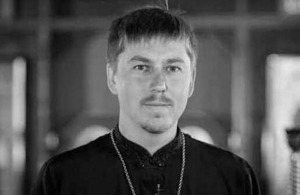
© Ahilla.ru
Reached on 3 January 2024, Chemodanova told Forum 18 she was busy and asked it to call back in 15 minutes. She did not subsequently answer her phone that day or on 4 January.
Forum 18 asked to speak to Plenipotentiary Rumak on 4 January. His secretary asked what Forum 18 wanted to talk about. When Forum 18 explained that it had questions about his address to the Minsk clergy as well as the new Religion Law, the secretary responded: “Aleksandr Rumak does not give interviews by phone.” She would not explain why not.
On 4 January, Forum 18 asked the secretary of Minsk Diocese, Fr Andrei Volkov, in writing whether the Diocese had invited Chemodanova and Rumak to address the clergy meeting or if the two officials had themselves decided to attend. Forum 18 had received no response by the end of the working day in Minsk of 4 January.
Dozens of Orthodox, Catholic and Protestant clergy and laypeople have been given fines or short-term jail sentences since 2020, especially for sharing or liking news items on social media from websites the regime has declared “extremist”, as Christian Vision has documented.
A number of clergy have fled Belarus, fearing possible punishment. Orthodox priest Fr Andrei Nozdrin left his parish in the village of Komotovo in the western Grodno Region after the liturgy on 25 December 2023. He is now in Poland, he announced on his Facebook page on 30 December 2023. In April 2022, police warned Fr Andrei, and his Diocese transferred him to a remote parish, after he publicly opposed Russia’s renewed invasion of Ukraine, Belarus’ role in this, and his congregation sang the hymn Mighty God, which the regime has tried to ban.
“There weren’t threats” from officials at earlier clergy meetings
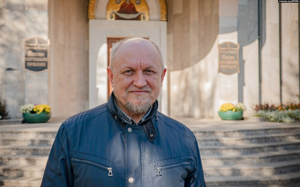
© Svaboda.org (RFE/RL)
Fr Aleksandr Shramko, who served in Minsk Orthodox Diocese until it banned him from serving in November 2019, says that the Plenipotentiary for Religious and Ethnic Affairs and some of his officials would sometimes attend clergy meetings. “It was not so often, but it happened,” he told Forum 18 on 4 January from Lithuania, where he how lives. “It was always the then Plenipotentiary Leonid Gulyako or one of his officials, never someone from the Ideology Department.”
Fr Aleksandr does not recall officials threatening the clergy during meetings he attended. “We were able to ask questions. I asked Gulyako a question, and his response was insulting towards me rather than answering the question. But there weren’t threats.”
Fr Aleksandr says the situation changed in 2020, the year of mass protests at the falsified presidential elections. “Until then, the authorities believed that all was under control. They had contact with the hierarchy and believed the Church was under control,” he told Forum 18. “But they discovered it wasn’t so. They understood that they needed to step up the pressure, not just on the hierarchy but on the lower clergy.”
Officials’ warnings reinforce provisions of new Religion Law
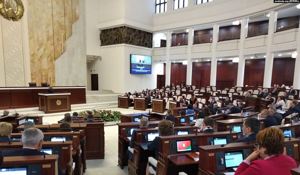
© Svaboda.org (RFE/RL)
In their addresses to Minsk Orthodox Diocese clergy, Olga Chemodanova and Aleksandr Rumak were reinforcing state restrictions to be imposed just weeks later in the repressive new Religion Law.
Plenipotentiary Rumak – whose office drafted the new Law – stated in his June 2023 justification for it that the regime wants, among other things, to ban religious communities from using any symbols apart from religious symbols and ban “the activity of religious communities directed against the sovereignty of the Republic of Belarus, its constitutional system and civic accord”.
The proposed Law was approved by the lower chamber of the regime’s non-freely elected parliament, the House of Representatives, on 29 November 2023 and by the upper chamber, the Council of the Republic, on 13 December 2023. Aleksandr Lukashenko then signed it into law on 30 December 2023, though his press service did not announce this until 3 January 2024 (see forthcoming F18News article).
Plenipotentiary Rumak also told the assembled priests that the Belarusian Orthodox Church had more foreign citizens working in religious roles than any other religious community in Belarus.
The regime has consistently tried to reduce the number of foreign citizens the Plenipotentiary allows to work in registered religious organisations. The Plenipotentiary has often rejected applications by leaders of religious organisations for permission to bring in foreign citizens, including applications by Orthodox and Catholic bishops.
The last foreign Catholic priest known to have been forced to leave Belarus was Polish citizen Fr Jozef Geza, who had served as parish priest in the western city of Grodno since 1997. He left in December 2022 after Plenipotentiary Rumak refused his bishop’s request to extend permission for him to continue to serve in the country.
Chemodanova – from police spokesperson to ideologist
Police Colonel Olga Chemodanova was spokesperson for the Interior Ministry (which controls the police) from December 2018 until her removal in October 2021. During mass protests at the regime’s falsification of election results in autumn 2020, she defended the police’s brutal crackdown. The European Union added her to its sanctions list in June 2021.
Chemodanova was then appointed Head of the Ideology Department of Minsk City Executive Committee, where she has been involved in restricting religious communities’ rights to freedom of religion or belief.
Chemodanova drafted the 1 August 2022 official letter, signed by Deputy Chair of Minsk City Executive Committee Artyom Tsuran, warning New Life Full Gospel Church that it had broken the law by holding Sunday services in the car park of its confiscated building that summer without official permission. It warned that if the “violation” is repeated within a year, the regime’s senior religious affairs official, Plenipotentiary Rumak, could go to court to liquidate the Church, with a possible ban on its activity as the court considers the suit.
Chemodanova similarly drafted subsequent letters to New Life Church on behalf of Tsuran.
Years of state pressure on Minsk’s New Life Church
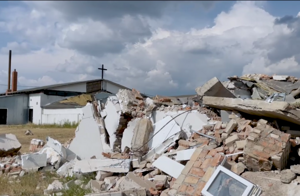
© New Life Church [CC BY-NC-ND 4.0]
New Life Church was founded in Minsk in 1992, gaining state registration in December of that year. The Church is a member of the Full Gospel Union, headed by Bishop Leonid Voronenko, and has been led since its foundation by Pastor Vyacheslav Goncharenko.
The regime always refused to change the legal designation of the Church’s place of worship, a former cowshed. From 2009, officials repeatedly tried to evict the Church. On 17 February 2021, 30 police and court bailiffs forcibly evicted New Life from its building, using an angle grinder to cut the door lock to gain entry.
After being expelled from its own place of worship, New Life Church held its worship services in the car park outside each Sunday, whatever the weather. Minsk City Executive Committee refused to allow such meetings. Pastor Goncharenko was detained and fined in September 2022 under Administrative Code Article 24.23 (“Violation of the procedure for organising or conducting a mass event or demonstration”). Another pastor was similarly detained and fined.
On 25 September 2022, police banned the Church’s Sunday meeting for worship in its car park, threatening to detain anyone who did not leave. On 20 June 2023, officials bulldozed New Life’s church building.
New Life Church also faced tax demands. In August 2023, decisions from several courts declared some of the Church’s online materials “extremist”. Its website had already been blocked.
In August 2023, 20 armed police officers from the Organised Crime and Corruption Department searched Pastor Goncharenko’s home in Minsk. The following day, a court jailed him for 10 days and the Church’s youth pastor for 5 days. The jailing of Pastor Goncharenko appeared timed to prevent him taking part in the first of the court hearings to declare the Church’s internet materials “extremist”.
Supreme Court finally liquidates New Life Church

© Spring96.org [CC BY 3.0]
On 15 September 2023, Minsk City Executive Committee lodged a liquidation suit against New Life Full Gospel Church to Minsk City Court. The City Court upheld the suit on 17 October 2023. However, the Church appealed against the decision to the Supreme Court in Minsk. The decision did not come into force until the appeal was heard.
Deputy Head of Minsk City Executive Committee’s Ideology, Religion, and Ethnic Affairs Coordination Department Yekaterina Kaverina called for the Church’s liquidation because local courts had found some of the Church’s online materials “extremist”. She also claimed that the Church had conducted activity not set out in its statute. The Minsk City Court decision does not specify what that activity was.
At a two-hour hearing at the Supreme Court on the morning of 12 December 2023, a panel of three Judges led by Judge Sergei Nikolayev upheld Minsk City Executive Committee’s suit to liquidate New Life Church. Kaverina of Minsk City Executive Committee again appeared in court to support the liquidation suit.
Church members joined Pastor Vyacheslav Goncharenko at the Supreme Court for the appeal hearing. Sergiy Melyanets, a member of another Minsk Protestant Church, was also present to support church members. He noted the contrast with the lower court hearing, where only a small number of church members were allowed in the small court room, allegedly because of coronavirus restrictions. By contrast, some 20 church members were allowed to attend the Supreme Court hearing, he noted, with others waiting outside.
“There was not one police officer in the court room,” Melyanets noted on Facebook later that day. “This is very strange, given that the judges have gathered to consider the liquidation of an organisation that (in the authorities’ view) had engaged in extremist actions.”
The Church’s lawyer “repeated what had been said in earlier hearings that it was not allowed simply to take and liquidate the church which has served people, society, and God for 31 years simply because of several items placed on the internet which were deemed extremist. Even more so as the items were removed immediately after the court decision”, Melyanets noted. “It turns out that in our country you can,” he commented.
In his testimony, Pastor Goncharenko spoke of the work the Church had done over decades, including many social projects to help orphans, and those with drug and alcohol dependency. “We have worked and created for 31 years and here we suddenly discover that our church is being liquidated because we got involved in some kind of extremism,” he told the court. “This word is for me like an insult. It cannot be associated with us in any way.”
Asked about why the Church had not removed a video from three years earlier the court found extremist, Pastor Goncharenko reminded the court that Church member and retired deputy head of the Constitutional Court Valery Fadeyev that the videos did not represent “extremism”.
The chair of the Judges, Nikolayev, prevented Church members from speaking about its work over 31 years, insisting that they should speak only about the “issue in contention”.
City Executive Committee official Kaverina said little during the hearing, merely confirming its suit to liquidate New Life Church.
“After a few minutes the judges come out and read the decision. No surprises”
After nearly two hours, the Judges withdrew for about half an hour to consider their decision. “This was very strange,” Melyanets commented. “Usually in such hearings where I have been present (including when I was before the court), after the final presentation by both sides the Judge immediately took from their case the printed court decision, not hiding that the decision had been taken even before the court hearing.”
As they waited for the Judges to return, Church members asked Kaverina of the City Executive Committee why she had not spoken about the good the Church had done for society in cooperation with the Executive Committee. “In my time nothing good was done,” Melyanets quotes her as responding. The official admitted she had not long been in the job.
Kaverina insisted to church members in the court room that she was a state official and had no choice in bringing the suit against New Life Church. Church members asked her if it was not absurd that a thousand-member Church was being liquidated because of an online video that had been deleted. She insisted that the court would decide.
“After a few minutes the judges come out and read the decision,” Melyanets noted. “No surprises.” The Judges upheld the lower court decision liquidating New Life Church. The decision cannot be appealed further and came into force on being delivered in the court room.
Speaking in a video message to New Life’s supporters later on 12 December, Pastor Goncharenko confirmed that the Church was now liquidated in court. However, he likened the Church to a child. “When a child is born they are given a birth certificate. The birth certificate can be lost, burnt or destroyed, but the child remains.” He noted that thousands of believers – both from within the Full Gospel Union and outside – were praying for the Church.
As of 4 January 2024, the Supreme Court has not yet issued the decision in writing.
Kaverina of Minsk City Executive Committee refused to answer any questions. “I will not give you any comment,” she told Forum 18 on 3 January, before putting the phone down.
New Life Pastor questioned
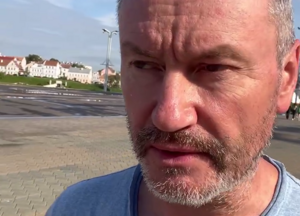
© New Life Church [CC BY-NC-ND 4.0]
On 22 December, the Investigative Committee summoned New Life Pastor Vyacheslav Goncharenko for questioning. He was released later in the day and returned home, his wife noted the same day.
Investigators questioned Pastor Goncharenko about a traffic accident on 10 July 2023, when a bus carrying 50 children going to the Church’s summer camp overturned due to a poorly-maintained road. No serious injuries were reported, and parents have not made any complaints about the accident, the camps, or New Life Church and its leadership.
On the same day, the state-controlled media Minsk Pravda published online a detailed report of the accident quoting the participants and the officials dealing with it. The article was written in neutral tones, without any criticism, stating that the reason for the accident was the poor quality of the road surface.
The next day, Minsk Pravda published a totally different article, and almost immediately Minsk Prosecutor’s Office started summoning people connected with the summer camp for questioning.
Threat of criminal prosecution
Now that New Life Church has been liquidated, any future activity in the exercise of freedom of religion or belief could lead to a fine or jail term.
Any activity by unregistered or liquidated religious communities can lead to prosecution under Criminal Code Article 193-1. This punishes “organisation of or participation in activity by an unregistered political party, foundation, civil or religious organisation” with a fine or imprisonment for up to two years.
At least eleven individuals given fines, short-term jailing in 2023
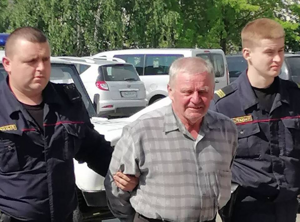
© Baptist Council of Churches
At least 11 individuals in 2023 are known to have been punished under Administrative Code Article 24.23 (“Violation of the procedure for organising or conducting a mass event or demonstration”) for exercising freedom of religion or belief without state permission. Punishments are a fine of up to 100 base units (about two months’ average wage), or community service, or 15 days’ imprisonment.
The 11 individuals known to have been punished in 2023, according to decisions seen by Forum 18:
– 28 April 2023, seven young Protestants sharing faith on the streets, Minsk’s Central District Court, each fined between 90 and 100 base units, between 3,330 and 3,700 Belarusian Roubles
– 2 June 2023, Council of Churches Baptist Vladimir Burshtyn who held outdoor meeting, Drogichin District Court, Brest Region, 15 base units, 555 Belarusian Roubles
– 26 July 2023, leader of an unregistered Church, Molodechno District Court, Minsk Region, fined 25 base units, 925 Belarusian Roubles
– 15 September 2023, Orthodox Christian Nikolai Bondar for leading pilgrimage, Beshenkovichi District Court, Vitebsk Region, fined 20 base units, 740 Belarusian Roubles
– 2023, religious believer, led outdoor religious event without state permission, 10 day jail term
This compares with at least 8 individuals (seven of them Protestants, including Pastor Goncharenko of New Life Church, and one of traditional folk beliefs) known to have been punished under Administrative Code Article 24.23 in 2022.



